Your customers are a mirror… it’s a powerful idea that shifts the responsibility for your success right back onto you. It means the energy you put out is exactly what you get back from your clients. Let’s break down why this is a game-changer for anyone in a client-facing role.
Share Image Quote:Table of Contents
Meaning
At its core, this quote means your customers will reflect the exact attitude, energy, and level of service you project. They’re your mirror.
Explanation
Here’s the real-world, gut-check truth of it. I’ve seen this play out so many times. When you’re frustrated and short with people, guess what? You attract difficult, demanding clients. It’s like a self-fulfilling prophecy. But when you’re genuinely enthusiastic, patient, and focused on providing immense value, you start attracting fantastic customers who are a joy to work with. It’s not magic; it’s cause and effect. Your internal state dictates your external reality in business.
Quote Summary
| Context | Attributes |
|---|---|
| Original Language | English (3668) |
| Category | Business (233) |
| Topics | attitude (43), reflection (15), service (57) |
| Literary Style | assertive (142), metaphorical (61) |
| Emotion / Mood | calm (491), provocative (175) |
| Overall Quote Score | 79 (243) |
Origin & Factcheck
This gem comes straight from Brian Tracy’s classic, “The Psychology of Selling,” which was first published in the late 1980s in the United States. It’s a cornerstone of his sales philosophy. You sometimes see similar sentiments floating around, but this specific phrasing is authentically Tracy’s.
Attribution Summary
| Context | Attributes |
|---|---|
| Author | Brian Tracy (375) |
| Source Type | Book (4032) |
| Source/Book Name | The Psychology of Selling (65) |
| Origin Timeperiod | Contemporary (1615) |
| Original Language | English (3668) |
| Authenticity | Verified (4032) |
Author Bio
Brian Tracy, a prolific author gained global reputation because of his best seller book list such as Eat That Frog!, Goals!, and The Psychology of Selling, and created influential audio programs like The Psychology of Achievement. He is sought after guru for personal development and business performance. Brian Tracy International, coaches millions of professionals and corporates on sales, goal setting, leadership, and productivity.
Official Website |Facebook | X | Instagram | YouTube |
Where is this quotation located?
| Quotation | Your customers are a mirror of your own attitude |
| Book Details | Publication Year/Date: 1988; ISBN: 978-0785288060; Last Edition: HarperCollins, Revised Edition 2006; Number of Pages: 240 |
| Where is it? | Chapter 27: Attitude and Reflection, Page 95 / 240 |
